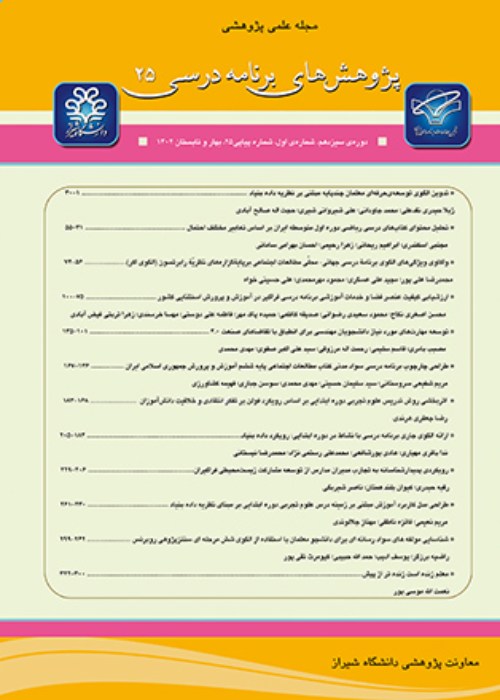The Role of Epistemological Beliefs in the Self-efficacy and Emotions of Special Education Teachers’ Implementation of Curriculum
One of the factors playing an important role in improving the quality of the curriculum, especially that of children with special needs, is the quality of teachers’ teaching. Considering the limited budget resources devoted to the education system and the need to use these resources optimally, identifying the variables affecting the quality of teachers’ teaching is of great significance and provides the basis for genuine academic progress. Among the effective factors in improving the quality of teachers’ teaching are cognitive factors such as content knowledge, cognitive skills, teaching experiences, and teaching emotions (positive or negative) experienced by teachers during the teaching process. The quality of teachers’ teaching can have positive or negative effects on students’ learning. Previous research shows that most studies examining factors influencing the quality of teaching have mainly focused on cognitive factors, such as teachers’ subject knowledge, cognitive skills, and educational experiences (Kington, Sammons, Day & Regan, 2011). However, the emotional aspects of teaching and teachers have been paid less attention, even in recent research (Anttila et al., 2016). Any research shedding light on these aspects of teaching can provide useful information to educational planners, policymakers, and school administrators and, especially, help teachers increase their positive emotions and self-efficacy. This, in turn, can improve the overall status of the educational system and facilitate curriculum implementation.
1. Can epistemological beliefs predict special education teachers’ self-efficacy? 2. Can epistemological beliefs predict special education teachers’ teaching emotions?
This research adopted a descriptive survey and applied design. The statistical population included all primary teachers working in special needs schools in Mazandaran province in the academic year 2018-2019. The teachers were classified into three groups: mentally retarded, blind, and deaf. The study participants were selected from teachers in Babol, Mazandaran province, using cluster sampling. Three questionnaires, namely, Schommer’s epistemological questionnaire (1998), teacher emotions questionnaire (Frenzel et al., 2014), and teacher self-efficacy questionnaire (Tschannen-Moran & Woolfolk Hoy, 2001), were used to collect data.
The results showed that the total score of self-study with learning ability (r = -0.29), simple knowledge (r = -0.24), quick learning (r = -0.29), and the total score of epistemological beliefs (r = -0.34) had a negative and significant relationship. However, the relationship between definite knowledge and self-efficacy was not significant (r = 0.18). The results showed that the comprehensive involvement component had a negative and significant relationship with learning ability (r = 0.33), simple knowledge (r = 0.27), and epistemological beliefs (r = 0.31). The learning strategies component had a negative and significant relationship with quick learning (r = 0.27), definite knowledge (r = 0.39), and epistemological beliefs (r = 0.23). The classroom management component had a negative and significant relationship with learning ability (r = 0.22) and quick learning (r = 0.22). The results showed that among the components of epistemological beliefs that were entered into the regression equation, only learning ability was found to be a predictor variable (Beta = -0.32, P < 0.01). The value of F = 10.02 (94, 1) revealed the statistical significance of the relationship at the level of 0.01. The adjusted squared multiple correlation was 0.09, which shows that about 9% of the variance in teachers’ self-efficacy can be explained by the learning ability component. The results showed that the components of simple knowledge (Beta = -0.48, P < 0.01), definite knowledge (Beta = -0.31, P < 0.01), and learning ability (Beta = -0.27, P < 0.01) entered into the regression equation as predictor variables. The value of F = 17.95 (92, 3) showed the statistical significance of the multivariate relationship at the level of 0.01. The adjusted squared multiple correlation was 0.35, which shows that about 35% of the variance in teachers’ sense of pleasure in teaching can be explained by the components of simple knowledge, definite knowledge, and learning ability.
Considering the fact that epistemological beliefs predicted the special education teachers’ self-efficacy, the findings showed that the three components of the epistemological belief of inherent ability, simplicity of knowledge, and quick learning had an inverse and significant relationship with teachers’ self-efficacy. Among the components, the inherent ability to learn was found to predict self-efficacy. Teachers who believed that knowledge was simple, learning was dependent on innate abilities, such as intelligence, and learning can happen quickly and not gradually felt low efficiency in teaching students with special needs. On the other hand, teachers who believed that knowledge was relative and complex, the ability to learn was acquired, and students’ learning can happen gradually felt more worthy and efficient in their teaching and were more likely to use appropriate educational tools to improve their students’ learning. Given that epistemological beliefs predicted special education teachers’ teaching emotions, the results indicated that, except for the definite knowledge component, there was a positive relationship between the components of epistemological beliefs and negative emotions in teachers. In other words, the ability to learn had a negative relationship with pleasure and a positive relationship with shame. In conclusion, it can be said that the teachers had cruder epistemological beliefs than expected.
- حق عضویت دریافتی صرف حمایت از نشریات عضو و نگهداری، تکمیل و توسعه مگیران میشود.
- پرداخت حق اشتراک و دانلود مقالات اجازه بازنشر آن در سایر رسانههای چاپی و دیجیتال را به کاربر نمیدهد.



